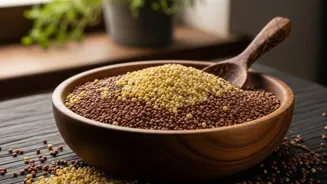For centuries, millets have quietly powered communities across the world. These humble, resilient grains are packed with remarkable health benefits. In an era where refined carbohydrates dominate our plates,
these ancient grains are making a much-needed comeback. Naturally gluten-free, rich in fibre, and brimming with essential nutrients, millets can seamlessly fit into modern lifestyles while offering powerful health advantages.
“The world equates anything other than wheat to be weak. But in the case of millets, it’s quite the opposite. They’re humble, nutrient-dense, and incredibly versatile,” says Ajay Kangralkar, Founder of SkyRoots. From a comforting porridge to a hearty roti or a refreshing salad, millets can replace most grains while improving energy, digestion, and overall vitality. Here are some of the benefits of adding millet to your daily diet.
1. Nutrient-Dense & High in Fibre
Millets are loaded with essential vitamins, minerals, and dietary fibre. Rich in iron, magnesium, phosphorus, and B-complex vitamins, they support nerve function, bone health, and sustained energy production. “Their high fibre content keeps you full for longer, curbing constant food cravings,” notes Kangralkar.
2. Supports Stable Blood Sugar Levels
With a low glycaemic index, millets release sugar slowly into the bloodstream, preventing sharp glucose spikes. This makes them ideal for diabetics and those seeking to improve insulin sensitivity.
3. Heart-Healthy Choice
Millets contain magnesium and potassium, which help regulate blood pressure, while their fibre lowers LDL (bad) cholesterol and maintains HDL (good) cholesterol. This unique combination reduces the risk of heart disease.
4. Aids in Weight Management
Slow-digesting complex carbohydrates in millets provide sustained energy without frequent hunger pangs. High in protein and fibre, they promote satiety, making them ideal for healthy weight control.
5. Improves Gut Health
A healthy gut microbiome depends on adequate fibre – something millets provide in abundance. Finger millet (ragi), in particular, also offers polyphenols and antioxidants that aid nutrient absorption and combat inflammation in the digestive tract.
How to Add Millets to Your Diet
Kangralkar advises starting small. He suggests replacing one refined grain-based meal with a millet-based dish like foxtail, pearl, or barnyard millet. “Over time, you’ll develop a taste and notice improvements in digestion, energy, and overall wellness,” he explains.
By embracing millets, you invest in better health, sustainable eating, and long-term vitality.













